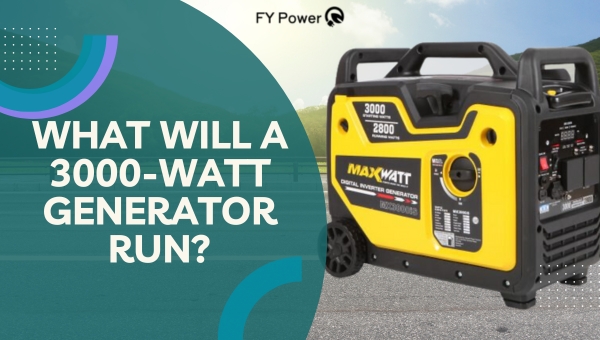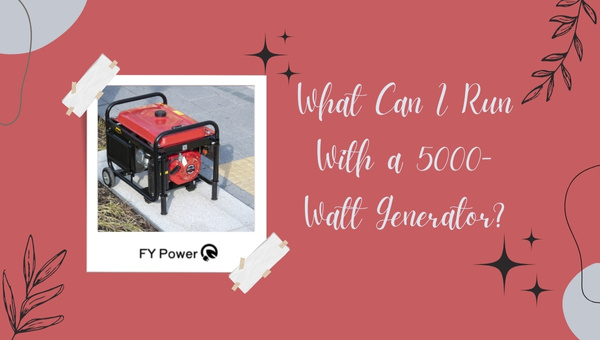Generators are indispensable tools that provide power during outages, outdoor events, or any situation where electricity is not available. Understanding the capabilities of a generator is essential to ensure that it meets your needs.
A 3000-watt generator is a popular choice because it offers a good balance between portability and power output. It’s strong enough to power a variety of common household appliances and tools yet still compact and lightweight enough to be transported and used anywhere.
This guide will help you understand what appliances and devices a 3000-watt generator can run so you can make an informed decision and plan accordingly. Knowing what you can power with a 3000-watt generator is essential, whether you’re preparing for a possible power outage, planning an outdoor event, or packing for a camping trip.
This article will provide you with a comprehensive list of appliances and devices that can be powered by a 3000-watt generator and some tips on how to use your generator efficiently. Keep in mind that the actual number of devices you can run simultaneously will depend on their individual power requirements and the generator’s rated and surge wattage.

Determining your Wattage Requirements
Before purchasing a generator, one needs to determine their specific power requirements. This involves listing all the appliances you intend to power during an outage and the watts required for each.
Remember to account for the surge power that many appliances need when starting up, which can be significantly higher than their running wattage.
Related Post: Capability of a 10000-Watt Generator: What Will It Run?
What Can You Power With This Generator?
A 3000-watt generator can handle a reasonably wide array of appliances. Typical household items such as lights, a refrigerator, a microwave, a sump pump, and several chargers for small electronics are all within its power capacity.
However, keep in mind that this generator might not be sufficient to run multiple high-wattage appliances simultaneously.
FAQs
Will A 3000 Watt Generator Run A Central Air Conditioning?
While this may vary depending on the specific power consumption of your unit, most central air conditioning systems require more than 3000 watts, especially during startup. Thus, running central AC on a 3000-watt generator is generally not recommended.
Will A 3000 Watt Generator Run A Well Pump?
A small well pump, around 1/2 HP, often requires around 1000 watts, so a 3000-watt generator could theoretically run it. However, bear in mind that starting up the pump may require more power.
Will A 3000 Watt Generator Run A Refrigerator?
Yes, a 3000-watt generator should be able to run a refrigerator. Most household refrigerators require between 600-800 watts.
Will A 3000 Watt Generator Run An RV AC Unit?
Many RV AC units require less than 3000 watts, so running one using this generator should be possible.
Will A 3000 Watt Generator Run An Air Compressor?
The wattage required by an air compressor can greatly vary. A smaller unit may run on a 3000-watt generator, but larger models may require more power.
Will A 3000 Watt Generator Run A Sump Pump?
A typical 1/2 HP sump pump requires around 1050 watts, so a 3000-watt generator should be capable of running it.
Which Oil Is The Best For A 3000 Generator?
The oil choice depends on the manufacturer’s recommendations and the climate. Generally, a good quality 10W-30 oil is a safe bet for most climates.
How Many Amps Does A 3000 Generator Provide?
A 3000-watt generator, operating at full capacity at 120 volts, will output about 25 amps.
Which Transfer Switch Is The Best For A 3000-Watt Generator?
The choice of a transfer switch primarily depends on your power needs and your local regulations. For a 3000-watt generator, a manual transfer switch rated for 30 amps would generally suffice. Always consult with an electrician before installing a transfer switch.
Conclusion
In summary, a 3000-watt generator offers a versatile solution for powering a variety of household appliances and tools in situations like power outages, camping trips, or construction sites.
While it won’t run heavy-duty machinery or multiple high-wattage devices simultaneously, it can comfortably handle essential appliances such as fridges, fans, and lights, along with smaller gadgets like laptops and smartphones.
It’s also useful for powering small tools, making it a solid choice for both residential and light commercial needs. To maximize efficiency, it’s important to calculate the cumulative wattage of all intended devices and ensure it stays below the generator’s capacity.

